INSIDE: In this blog, we’ll discuss the essentials of iron-rich foods for babies, show you how easy it is to incorporate them into meals, and provide a free downloadable tip sheet with 9 iron-rich foods to simplify meal planning even more.
You’re sitting at the table, watching your baby toss a few spoons of food onto the floor—again. You take a deep breath, wondering, “Is he eating enough? And what about iron? How do I know if he’s getting enough of that?”
It’s one of those moments where you’re doubting yourself despite your best efforts. You’re trying so hard to give your baby the best start, but with so much conflicting advice, it’s easy to feel overwhelmed.
And then, there’s the added pressure from those ads constantly telling you how vital iron is, especially the ones for follow-on formula, which makes you question whether your baby is getting enough iron from food alone.
These ads play on our insecurities as parents, making us feel like we’re not doing enough unless we buy something. But here’s the reality: You don’t need a follow-on formula to ensure your baby gets enough iron. By choosing iron-rich foods for your baby, they can meet their needs in a simple, stress-free way, whether you’re breastfeeding or using first infant formula.
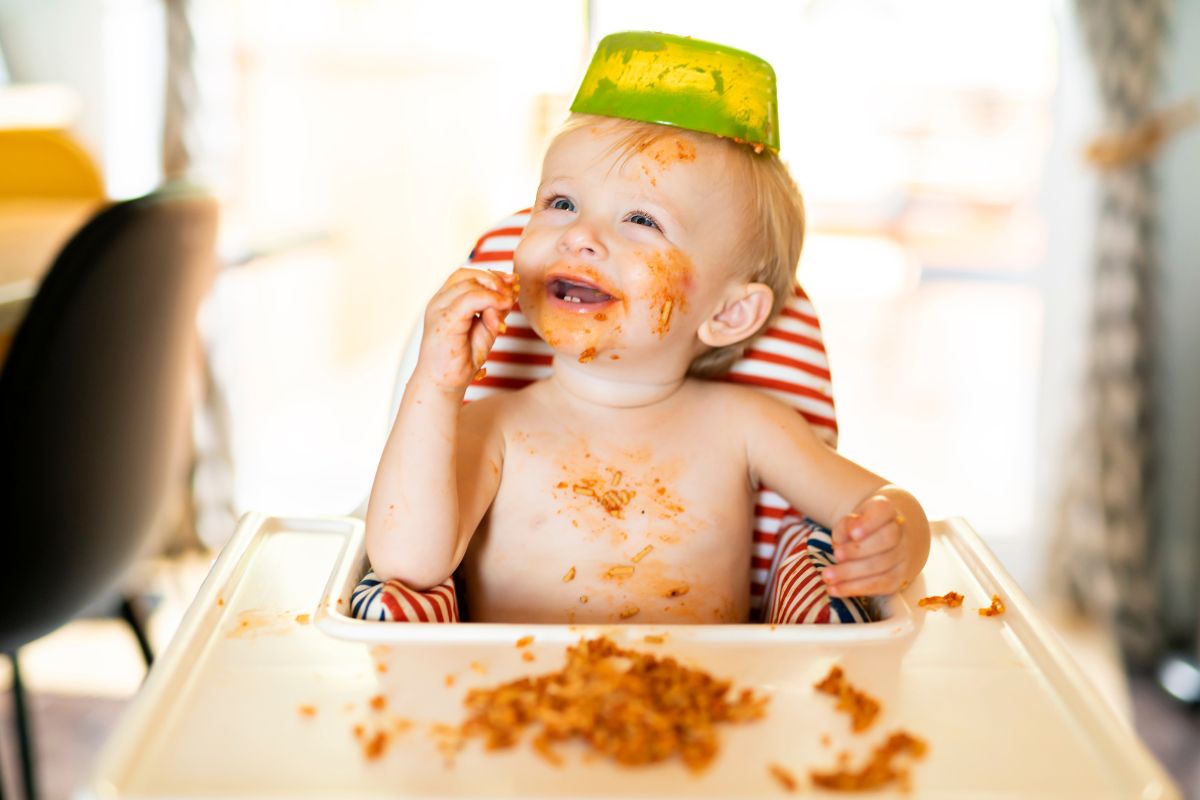
” How can I tell if my baby is getting enough iron?”
Bonus: As a bonus for joining my weekly newsletter, get this free downloadable checklist of 9 iron-rich foods for babies and simple ways to prepare them.
Why Iron-Rich Foods Matter for Babies
Iron is essential for your baby’s growth, particularly for brain development and forming haemoglobin, the protein in red blood cells that carries oxygen around the body. Babies are born with iron stores built up during pregnancy, but around six months of age, these stores begin to deplete, and babies need more iron from their foods.
But here’s an important point: iron stores don’t run out like clockwork at midnight when your baby turns six months old. While six months is a useful marker, the timing of iron depletion varies from baby to baby, depending on factors like birth weight and whether they were born full-term or premature. So, if your baby isn’t wolfing down solids straight away, don’t panic! Their iron stores won’t vanish overnight, and you’ll have time to introduce iron-rich foods gradually.
READ MORE: Signs your baby is ready for weaning: 3 easy things to watch out for

Iron stores don’t run out at exactly 6 months.
What Influences a Baby’s Iron Stores at Birth?
Not all babies are born with the same amount of iron. Several factors can influence your baby’s iron stores at birth:
- Birth Weight: Full-term babies with a healthy birth weight tend to have higher iron stores. Babies born prematurely or with a lower birth weight may have smaller reserves.
- Umbilical Cord Clamping: Delayed cord clamping (waiting for a minute or two before clamping) can transfer more blood from the placenta to the baby, increasing their iron stores. This practice can help give babies a stronger start in terms of iron.
- Maternal Iron Levels: Your iron levels during pregnancy can also influence your baby’s iron stores. If you were low in iron or had anaemia during pregnancy, your baby might need more iron from food earlier.
Understanding these factors can help you feel more confident about your baby’s starting point, but no matter where they begin, feeding them iron-rich foods will help ensure they get what they need as they grow.
Breastmilk and Iron: What You Need to Know
A common concern for breastfeeding parents is whether their babies are getting enough iron from breast milk. While breastmilk is relatively low in iron compared to formula, its iron is highly bioavailable—meaning your baby can absorb it more efficiently than the iron found in many foods or formula. This makes breastmilk an important source of iron during the early stages of life.
However, babies will need additional iron from solid food by around six months. But that doesn’t mean breastmilk suddenly becomes less important. It provides valuable nutrition, comfort, and a source of easily absorbed iron, even as you start introducing solids. So, if you’re breastfeeding, rest assured that your milk still plays a key role in supporting your baby’s development.
READ MORE: Want to take the confusion out of introducing solids to your breastfed baby?

Iron in breastmilk is very easy for babies to absorb
The Problem: “How Do I Know My Baby’s Getting Enough Iron Rich Foods?”
It’s normal to wonder if your baby is eating enough iron, especially when they seem more interested in playing with their food than eating it. This concern is especially common if you’re following baby-led weaning, where it’s harder to tell how much your baby is eating when food ends up on the floor as much as in their mouth!
One of the biggest worries for parents trying baby-led weaning is whether babies can consume enough iron through self-feeding alone. However, the BLISS (Baby-Led Introduction to Solids) trial showed that babies following baby-led weaning consume similar amounts of key nutrients, including iron, compared to spoon-fed babies. The key is to offer a variety of iron-rich foods regularly and trust that your baby will take in what they need over time. Babies are pretty good at regulating their intake, so it’s important to trust the process and let them explore food at their own pace.
9 Iron-Rich Foods for Babies
Here’s a list of iron-rich foods that are easy to incorporate into your baby’s diet. These foods include both haem iron (found in animal products, which is easier for the body to absorb) and non-haem iron (found in plant-based foods, which benefit from being paired with vitamin C to help with absorption).
- Beef: Red meat is one of the best sources of haem iron. Depending on your baby’s eating style, you can serve finely minced beef, slow-cooked strips, or shredded beef.
- Chicken Thighs: Chicken thighs contain more iron than breast meat. Cook them until tender, then shred or cut them into small, manageable pieces for your baby.
- Lentils: A plant-based powerhouse, lentils are rich in iron and easy to prepare. Serve them mashed or as part of a stew. Pair lentils with a vitamin C-rich food (like tomatoes) to boost absorption.
- Eggs: The yolk of an egg is packed with iron.Try omelettes, pancakes, muffins or just plain boiled egg. Eggs are simple to prepare and easy for babies to handle.
- Fortified Cereals: Baby cereals like Ready Brek and Weetabix are often fortified with iron, making them an easy go-to for breakfast. Mix them with fruit (such as berries or orange slices) to increase iron absorption.
- Tofu: Tofu, especially calcium-set tofu, is an excellent plant-based source of iron. It’s soft and easy for babies to eat, making it an excellent choice for baby-led weaning.
- Spinach: Dark leafy greens like spinach are rich in non-haem iron. For a nutritional boost, add spinach to purees, stir it into scrambled eggs or add to muffins.
- Dried Fruit: Foods like dried apricots and raisins are often overlooked but are high in iron. Just soak chop or mash dried fruits to reduce the choking risk for younger babies. Pair with vitamin C-rich foods to enhance iron absorption.
- Oily Fish (like sardines or salmon): Oily fish contain small amounts of iron and other essential nutrients like omega-3 fatty acids, which are great for brain development. You can serve these mashed or flaked into small pieces for your baby.
READ MORE: Easy ways to serve Weetabix for babies-and why to do it!
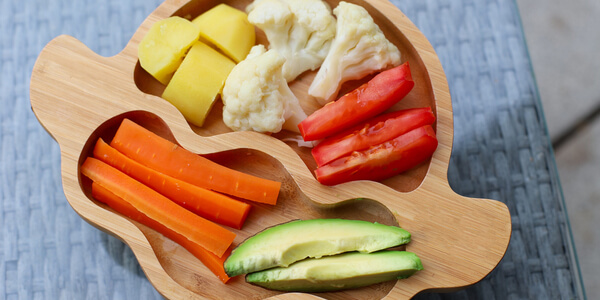
Plates of veg look great in photos but they are not iron rich foods (you need an iron and energy source in the meal too)
Bonus 10. Almonds and Nuts
Nuts, especially almonds, are often overlooked but are sources of iron. You buy ground almonds and mix them into porridge, yoghurt, or sprinkle them over fruit for an easy iron boost. Smooth almond butter is another safe option for babies when spread thinly on toast or mixed into soft foods.Ensure nuts are finely ground for safety, as whole and chopped nuts pose a choking hazard for babies.
Nuts can be a versatile and nutritious addition to your baby’s diet, offering iron and healthy fats, which are important for growth and brain development. Just be sure to introduce them carefully and in an age-appropriate form.
Quick and easy recipe ideas for iron-rich foods for babies
These recipes are easy to prepare, nutrient-dense, and perfect for weaning.
1. Beef
Spoonfeeding:
- Beef & Veggie Puree: Slow-cook beef with carrots, potatoes, and peas. Blend into a thick puree, mash or chop finely.
- Beef & Sweet Potato Mash: Roast sweet potatoes, and mix with finely minced, cooked beef and milk.
- Bolognese sauce: Cook minced beef, onions, garlic, herbs, carrots, and tinned tomatoes, then blend to your desired consistency or serve without blending for older babies.
Finger Food:
- Beef Strips: Slow-cook beef until tender, then shred or cut into soft strips.
- Mini Beef Burgers: Mix minced beef with finely grated veggies, form small patties, and fry in a little oil until cooked through.
- Beef Meatballs: Combine minced beef with oats and grated veggies, form into small meatballs, and bake or fry.
2. Chicken Thighs
Spoonfeeding:
- Chicken & Butternut Squash Puree: Roast chicken thighs and butternut squash, then blend into a smooth puree.
- Chicken & Carrot Mash: Boil chicken and carrots until soft, then mash together with a little milk.
- Chicken & Avocado Mash: Mash cooked chicken thigh with ripe avocado for a creamy and iron-rich meal.
Finger Food:
- Shredded Chicken Thighs: Slow-cook or roast chicken thighs until tender, then shred into bite-sized pieces.
- Chicken Meatballs: Try these easy chicken meatballs made with celery, carrot and chicken thighs.
3. Lentils
Spoonfeeding:
- Lentil & Veggie Puree: Cook lentils with carrots and spinach, then puree for a smooth texture, mash or serve as it is.
- Lentil & Sweet Potato Mash: Combine boiled lentils with mashed sweet potato and a dash of olive oil.
- Lentil & Tomato Soup: Simmer lentils with tomatoes and carrots, then blend into a smooth thick soup.
Finger Food:
- Lentil Burgers: Mix cooked lentils with oats, form into mini burgers, and bake until firm enough for little hands to hold.
- Lentil & Veggie Fritters: Combine cooked lentils with grated carrot, courgette and egg and form into small fritters, and bake or lightly fry.
4. Eggs
Spoonfeeding:
- Scrambled Egg: Scramble eggs with a splash of milk for a soft texture.
- Egg & Avocado Mash: Mash boiled egg with ripe avocado for a creamy, nutrient-packed meal.
- Egg & Carrot Puree: Mix boiled egg yolk with steamed, mashed carrots for a smooth spoonable option.
Finger Food:
- Boiled Egg Halves: Hard boil eggs, slice quarters (lengthways), and serve as finger food.
- Egg Fritters: Mix egg with finely grated veggies and cook in small rounds like mini pancakes.
- French Toast Soliders: Dip bread into beaten egg, then fry until golden and cut into strips for easy grabbing. Serve with chia jam.
5. Fortified Cereals (Ready Brek)
Spoonfeeding:
- Ready Brek & Banana Porridge: Prepare Ready Brek and mash in ripe bananas for smooth and sweet porridge.
- Ready Brek with Berries: Cook Ready Brek with water, then stir in mashed or pureed strawberries or blueberries.
- Weetabix and banana: Mix Weetabix with mashed banana, milk and a pinch of cinnamon for a delicious and easy breakfast.
READ MORE: Easy ways to serve Weetabix for babies-and why to do it!
Finger Food:
- Ready Brek Oat Bars: Mix Ready Brek with mashed bananas and bake into soft bars.
- Ready Brek Pancakes: Combine Ready Brek with egg and mashed banana to make small, soft pancakes.
- Ready Brek Muffins: These are super little handy muffins for babies who like to feed themselves.
- Tofu
Spoonfeeding:
- Tofu & Veggie Puree: Blend silken tofu with steamed carrots and broccoli for a smooth, protein-packed puree.
- Tofu & Sweet Potato Mash: Mash soft tofu with roasted sweet potatoes for a creamy texture.
- Tofu & Avocado Cream: Blend or mash tofu with ripe avocado for a rich, smooth dish.
Finger Food:
- Tofu Slices: Cut firm tofu into thick slices and lightly sauté until golden for a perfect finger food.
- Tofu Scramble: Fry the crumbled tofu with a selection of finely chopped or grated veggies and cook until soft.
- Tofu & Spinach Patties: Combine tofu with a variety of vegetables, cheese and breadcrumbs to make these little patties.
Looking for expert guidance on plant-based weaning? My Ready, Steady, Wean course covers everything you need, including a dedicated section on plant-based nutrition for your baby
7. Spinach
Spoonfeeding:
- Spinach & Apple Puree: Steam spinach and blend with cooked apples for a sweet and savory puree.
- Spinach & Sweet Potato Mash: Mix steamed spinach with mashed sweet potato and a little olive oil.
- Spinach & Pea Puree: Blend steamed spinach with peas and a little water or stock for a smooth puree.
Finger Food:
- Spinach & Cheese Muffins: Mix spinach with cheese and whole wheat flour, bake into mini muffins for easy self-feeding.
- Spinach & Lentil Bites: Combine cooked spinach and lentils, form into small balls, and bake or fry lightly.
- Spinach & Egg Omelette Fingers: Make a spinach and egg omelette, then cut it into strips for easy grabbing.
8. Dried Fruit
Spoonfeeding:
- Apricot & Apple Puree: Soak dried apricots in water, blend with steamed apples for a sweet, iron-rich puree.
- Raisin & Oat Porridge: Cook oats with water or milk, then stir in finely chopped raisins.
- Dried Fruit & Sweet Potato Mash: Mix finely chopped dried fruit like apricots with mashed sweet potato for a naturally sweet dish.
Finger Food:
- Dried Fruit Bars: Blend dried apricots and raisins with oats, form into bars, and bake.
- Dried Fruit & Oat Bites: Combine finely chopped dried fruit with oats and form into small bites, bake until firm.
- Raisin & Carrot Muffins: Mix raisins into mini carrot muffins for a nutrient-packed snack.
9. Oily Fish (Sardines or Salmon)
Spoonfeeding:
- Salmon & Sweet Potato Puree: Blend cooked salmon with roasted sweet potatoes for a soft, nutrient-dense puree.
- Sardine & Carrot Mash: Mash sardines with cooked carrots and a little olive oil.
- Salmon & Avocado Cream: Blend cooked salmon with avocado for a creamy, spoonable dish.
Finger Food:
- Salmon (or tuna) Patties: These tuna fishcakes contain 3 high iron foods, egg, tuna and almonds.
- Sardine Strips: Lightly cook sardines and offer soft, easy-to-handle strips.
- Salmon & Spinach Fritters: Combine cooked salmon with spinach and egg, form into small fritters, and cook until firm.
These recipes can help you offer a variety of iron-rich meals that suit your baby’s developmental stage, whether you’re spoon-feeding or offering finger foods!
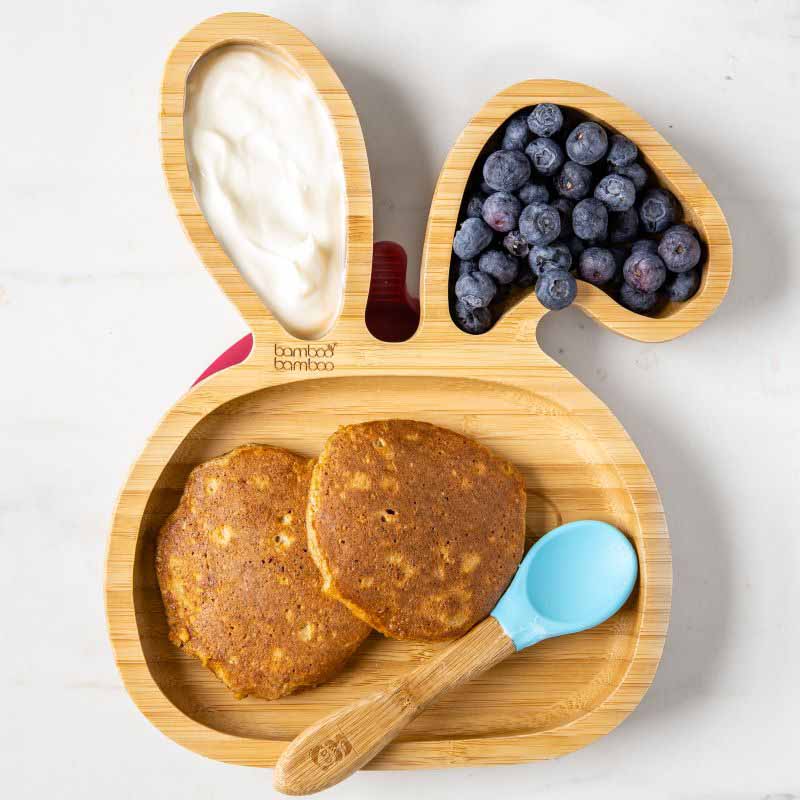
Vitamin C (blueberries) help your baby to absorb iron from the food (pancakes)
How to Maximize Iron Absorption
To help your baby absorb the iron they eat, it’s helpful to know that haem iron (from animal sources) is absorbed more efficiently than non-haem iron (from plant-based foods). However, you can improve non-haem iron absorption by pairing it with foods high in vitamin C.
For example, serving lentils with a tomato-based sauce or offering slices of orange alongside beans can significantly boost your baby’s iron intake. Other vitamin C-rich foods to pair with iron-rich options include strawberries, red peppers, and broccoli.
The Meal Planning Rule of Three
A practical way to keep iron in mind when planning meals for your baby is to use the Rule of Three. When thinking about breakfast, lunch, or dinner, aim to include three components:
- An iron-rich food: Choose something from the list above, whether animal-based (like chicken or beef) or plant-based (like lentils or fortified cereals).
- A source of vitamin C: This could be fruits like oranges, strawberries, or kiw, or vegetables like tomatoes or broccoli.Vitamin Cs helps with iron absorption, especially from plant-based foods.
- An energy-rich food: Include whole grains, potatoes, or avocado to ensure your baby gets the energy it needs for growth and development.
For example, a lunch could include mashed lentils an (iron-rich food), some slices of red pepper (vitamin C), and a small portion of sweet potato an (energy-rich food). This simple approach keeps your baby’s meals balanced and helps you naturally include iron-rich foods without overthinking it.
NEED MORE IDEAS: The Tricky Third Meal-Quick and Easy Baby Lunch Ideas
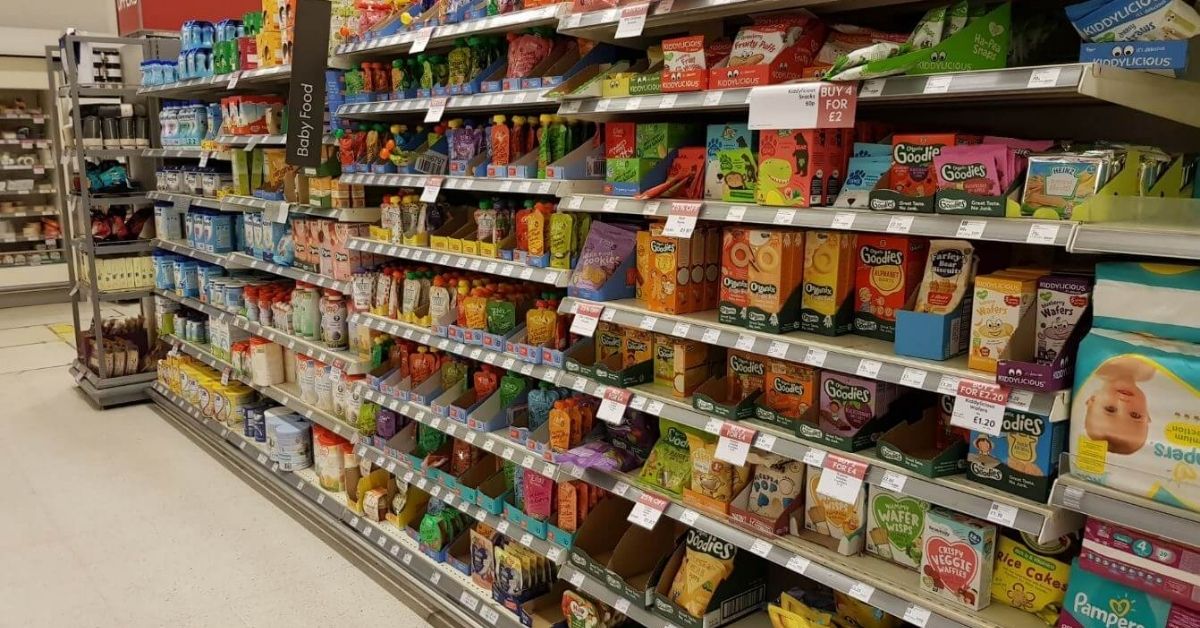
Shop bought baby food are not rich in iron
IRON IN SHOP BOUGHT BABY FOODS
In addition to offering home-cooked iron-rich foods, many parents opt for shop-bought baby foods for convenience. While these can be helpful on busy days, it’s essential to be mindful of their iron content. A review of UK baby foods reveals that many commercially produced meals contain less iron than homemade equivalents. This is often due to the small quantities of meat or fish in pre-packaged baby foods and the processing methods used, which can diminish the nutritional value of ingredients, including iron.
For example, baby foods marketed as “meat” or “fish” dishes may only contain a small percentage of those key ingredients, contributing less iron than expected. Additionally, the textures of shop-bought baby foods are often smoother than home-cooked versions, potentially impacting how your baby learns to chew and swallow.
Frequently Asked Questions about iron for babies
- How much iron does my baby need?
Babies aged 7-12 months need about 11 mg of iron daily. This might sound like a lot, but when you offer a variety of iron-rich foods throughout the week, you’ll be covering your bases. - What if my baby refuses meat?
That’s okay! Plenty of plant-based options, like lentils, beans, and tofu, are rich in iron. Just remember to pair them with vitamin C-rich foods to help with absorption. - Should I give my baby iron supplements?
Most babies can meet their iron needs through food, especially if you offer a range of iron-rich options. If you’re concerned, it’s always a good idea to check with your GP or dietitian.
Free Download: 9 Iron-Rich Foods Tip Sheet
To make things easier, I’ve created a free downloadable checklist that lists 9 iron-rich foods for babies and simple serving suggestions. You’ll get the checklist, plus join my weekly newsletter! Just click here to get it and subscribe. Whether spoon-feeding, baby-led weaning, or doing a bit of both, this tip sheet will help make meal planning less stressful. Keep it on your fridge for easy reference!
Wrapping Up: Iron Without the Stress
So, even if your baby is throwing a lot of food on the floor, you can relax knowing that you’re doing your job of providing them with a good iron source at every meal.
Iron-rich foods are easier to include in your baby’s diet than you might think. With a variety of simple foods like beef, lentils, eggs, and fortified cereals, paired with vitamin C-rich foods, your baby can get the iron they need without any stress. You don’t need to overcomplicate things—trust that your baby will eat what they need over time.
Bread for Babies Made Simple: Practical Tips and Expert Advice
Is bread suitable for your baby during weaning? This guide answers all your questions about when babies can eat bread, the safest types to choose, and how to introduce it while addressing concerns about salt, gluten, and allergens. You can introduce AFTER first finger...
Simple Baby Christmas Dinner Ideas: Healthy, Baby-Friendly Meals You Can Easily Prepare Ahead
INSIDE: Looking for a special baby Christmas dinner? Try these two easy ways to prepare a festive meal for your little one with healthy, baby-friendly ingredients that everyone can enjoy!I’ll be honest—my baby’s first Christmas was a bit of a juggling act. We were at...
Portion Sizes for Babies: The Easy Way to Know You’re Offering Enough
Portion sizes for babies aren’t about strict measurements. This guide shows you how to trust your baby’s hunger cues while offering balanced meals that suit their appetite.If you’ve ever found yourself staring at the spoon, wondering if that last bite was enough—or...

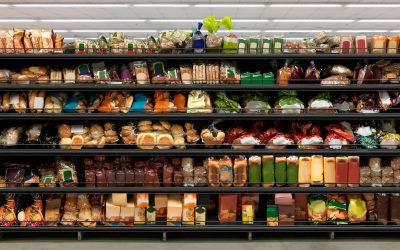

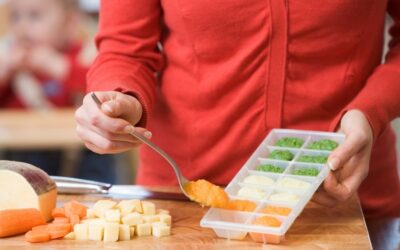


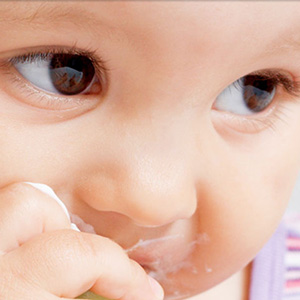


0 Comments